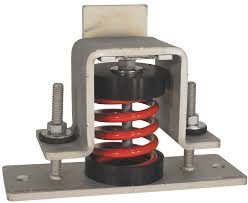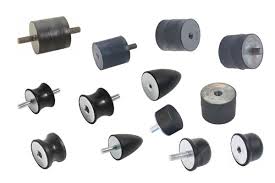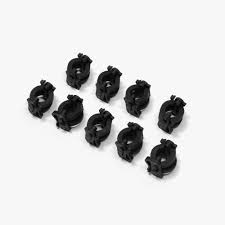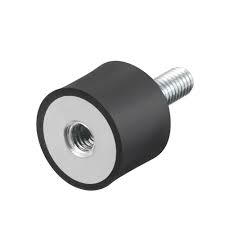Marine vibration isolators are an essential component for improving ship stability in rough sea conditions. These isolators are designed to minimize the impact of external vibrations on a ship's structure, machinery, and spring vibration isolators cargo, thus enhancing overall stability and safety at sea. In this article, we will explore the benefits and importance of marine vibration isolators in improving ship stability, and how they contribute to a smoother and safer sailing experience for both crew and passengers.
Marine vibration isolators are designed to reduce the impact of vibrations on ships, thus contributing to improved stability. These isolators work by absorbing and isolating the vibrations created by the ship's engines, machinery, and other sources, preventing them from being transmitted to the rest of the vessel. By minimizing the effects of vibrations, marine vibration isolators help to enhance the stability of the vibration isolators hvac ship, ensuring a smoother and safer sailing experience. This can be particularly crucial in rough seas or adverse weather conditions, where stability is essential for the safety and comfort of the crew and passengers.
Marine vibration isolators minimize the impact of vibrations on ships, contributing to improved stability. These isolators absorb and isolate the vibrations produced by the ship's engines and machinery, preventing them from being transmitted throughout the vessel. hvac vibration isolators By reducing the effects of vibrations, marine vibration isolators enhance ship stability, ensuring a smoother and safer sailing experience, particularly in rough seas or adverse weather conditions. This is vital for the safety and comfort of the crew and passengers.
Understanding the Importance of Marine Vibration Isolators

Understanding the Importance of Marine Vibration Isolators is crucial for ensuring the safety, performance, and longevity of marine equipment and machinery. These isolators are designed to reduce the transmission of vibration and shock from the engine or machinery to the vessel's structure, thus preventing damage, fatigue, and excessive noise. They also help protect delicate electronic equipment and improve the comfort of passengers and crew on board. Properly selected and maintained marine vibration isolators can significantly impact the overall reliability and efficiency of marine systems.
The Role of Marine Vibration Isolators in Ship Design

Marine vibration isolators play a critical role in ship design by reducing the transmission of mechanical vibrations and noise from various shipboard equipment and systems. These isolators are typically installed between the ship's structure and equipment to absorb and dampen vibrations, thereby preventing potential damage and improving crew comfort. The use of high-quality vibration isolators in ship design is essential for maintaining the structural integrity of the vessel and ensuring the longevity of onboard equipment. By effectively reducing vibration and noise levels, these isolators contribute to the overall operational efficiency and safety of the ship. In addition to protecting the ship's structure and equipment, marine vibration isolators also help minimize the impact of engine and machinery vibrations on crew members, enhancing their comfort and well-being during extended periods at sea. Overall, the inclusion of vibration isolators in ship design is crucial for mitigating the negative effects of mechanical vibrations and noise, ultimately contributing to the reliability, performance, and overall operational effectiveness of the vessel.
Choosing the Right Marine Vibration Isolators for Your Vessel

When choosing the right marine vibration isolators for your vessel, it's important to consider the type of engine and other machinery on board, as well as the specific conditions in which the vessel will operate. Factors such as the weight and size of the equipment, the frequency and amplitude of the vibrations, and the potential for exposure to harsh environmental elements all play a role in determining the most suitable isolator solution. It's also important to consider the durability and reliability of the isolators, as well as the ease of installation and maintenance. Working with a reputable supplier who can provide expert guidance and support in selecting and installing the right isolators can be invaluable in ensuring the long-term performance and safety of your vessel and its equipment. Ultimately, choosing the right marine vibration isolators is a critical aspect of maintaining the overall performance and integrity of your vessel, and should be approached with careful consideration of the specific needs and conditions of your operation.
Key Factors to Consider When Installing Marine Vibration Isolators

The key factors to consider when installing marine vibration isolators include the type of equipment being isolated, the operating environment, the magnitude and frequency of vibrations to be isolated, the weight and size of the equipment, and the material and construction of the isolators. It is also important to consider the compatibility of the isolators with the mounting points and the overall cost and maintenance requirements. Additionally, the choice of isolators should take into account the specific requirements and regulations for marine applications.
Maximizing Performance with High-Quality Marine Vibration Isolators
isolation mount
High-quality marine vibration isolators are essential for maximizing the performance and longevity of marine equipment and machinery. These isolators are designed to minimize the transmission of vibration and shock, reducing the risk of equipment damage and ensuring smooth and efficient operation. By effectively isolating the equipment from external vibrations and shocks, high-quality marine vibration isolators can enhance performance, accuracy, and reliability. They can also help to reduce noise levels, improving working conditions for crew members and minimizing the impact on the surrounding environment. Choosing the right marine vibration isolators is crucial for achieving optimal results. Factors such as load capacity, environmental conditions, and specific application requirements should be carefully considered when selecting isolators for marine equipment. Investing in high-quality marine vibration isolators can ultimately lead to cost savings by minimizing maintenance and repair costs, prolonging the lifespan of equipment, and improving overall operational efficiency.
The Impact of Marine Vibration Isolators on Crew Comfort and Safety
The Impact of Marine Vibration Isolators on Crew Comfort and Safety is significant. These isolators are designed to minimize the transmission of vibration and noise from the engines and machinery into the crew living and working areas. By reducing the levels of vibration and noise, these isolators can help prevent fatigue, motion sickness, and other health issues that may affect the crew. Additionally, they can also contribute to the overall safety of the crew by providing a more stable and comfortable environment, which in turn can improve concentration and reaction times in emergency situations. Overall, marine vibration isolators play a crucial role in enhancing crew comfort and safety on board marine vessels.
Innovations in Marine Vibration Isolators Technology
Marine vibration isolators technology has seen significant innovations in recent years in response to the need for efficient and effective solutions to minimize vibration and noise in marine environments. One such innovation is the use of advanced materials in the construction of marine vibration isolators, such as elastomeric compounds and composite materials, which offer improved performance and durability compared to traditional metal-based isolators. These materials can offer better vibration and noise attenuation, as well as increased resistance to corrosion and abrasion in harsh marine conditions. Another innovation in marine vibration isolators technology is the development of active isolation systems, which employ sensors and actuators to actively monitor and counteract vibration and noise in real-time. These systems can provide more precise and targeted isolation, adapt to changing conditions, and offer greater flexibility and control compared to passive isolators. Furthermore, advancements in computing and simulation technology have allowed for the development of more sophisticated modeling and analysis tools for designing and optimizing marine vibration isolators. This has led to the creation of more efficient and effective isolation solutions that can be tailored to specific marine applications and operating conditions. Overall, these innovations in marine vibration isolators technology have significantly improved the ability to mitigate vibration and noise in marine environments, leading to quieter and more comfortable working and living spaces on marine vessels and structures.
Maintaining and Troubleshooting Marine Vibration Isolators
Maintaining and troubleshooting marine vibration isolators involves regular inspection and lubrication of the isolator components to ensure proper functioning. This includes checking for worn or damaged parts, such as rubber isolator pads or springs, and replacing them if necessary. It is also important to check for any misalignment or excessive movement in the equipment that the isolators are supporting, as this can indicate a problem with the isolators. Troubleshooting may involve conducting a vibration analysis to identify the source of any excessive vibrations and taking corrective action, such as adjusting the tension on the isolator springs or realigning the equipment. Regular maintenance and troubleshooting of marine vibration isolators are essential to prevent equipment damage, improve performance, and ensure the safety of personnel on board.
In conclusion, the implementation of marine vibration isolators is essential for improving ship stability and reducing the impact of vibrations on board. By effectively isolating and dampening vibrations, these systems enhance the safety, comfort, and performance of marine vessels. It is clear that marine vibration isolators play a crucial role in ensuring a smooth and steady sailing experience.
See also
https://www.kineticsnoise.com/seismic/
تعليقات
إرسال تعليق